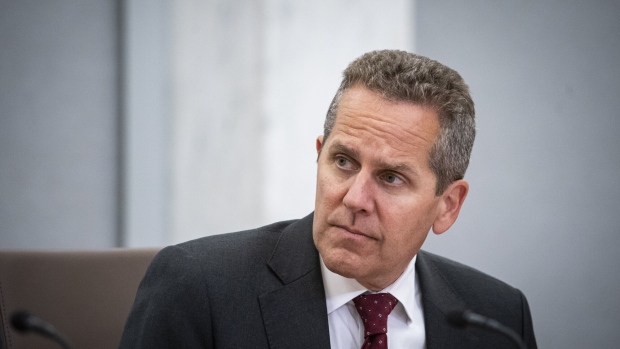Nov 7, 2023
Fed’s Barr Says Private Crypto Stablecoins Pose Financial Risk
, Bloomberg News

(Bloomberg) -- The Federal Reserve’s top bank watchdog said crypto stablecoins could amount to private money that might be destabilizing for the US financial system if left unchecked.
“There is interest in strong, federal regulation of stablecoins that makes sure the Federal Reserve can approve, regulate and enforce against stablecoin issuers, including wallets,” Michael Barr, vice chair for supervision, told attendees Tuesday at the DC Fintech Week event.
Barr was reiterating the central bank’s concern about private-industry crypto tokens pegged to assets like the US dollar and their potential to disrupt the broader financial world. “We need a strong framework,” he said. “It’s better if Congress can decide the rules of the road.”
The Fed continues to study technologies that would underlie a digital currency backed by the central bank, Barr told the audience. He previously has said the Fed wouldn’t move ahead without consent from Congress and the executive branch.
Meanwhile, Nellie Liang, the under secretary for domestic finance at the Treasury Department, said at the event that it’s “hard to say” what role unbacked cryptocurrencies and stablecoins will play in the financial system going forward.
Liang did, however, said she sees a use case for distributed ledger technology, in general. “The potential for that to bring efficiencies to payment and settlement seems pretty high,” Liang said.
Barr, who as a Fed governor votes on monetary policy, said the agency remains committed to taming US inflation. “It is really critical that we continue to do the work necessary to make sure we get inflation down to 2%,” he said.
Another top banking regulator, Michael Hsu, the acting comptroller of the currency, made a distinction between crypto, which he said is plagued by chicanery, and tokenization, which promises genuine efficiencies.
Problem Solver
While the crypto world is retail-oriented, largely driven by the hope of making some money, Hsu said “it still remains replete with fraud, scams and hacks, and some of the largest players remain unregulated.”
Tokenization, by contrast, is focused on solving an actual problem in finance, particularly with settlements. “There’s risk, there’s friction, there’s fees” in current set-ups, Hsu said in an interview with Bloomberg Television’s Romaine Bostick at the Washington event. “Tokenization holds the promise. It simplifies, if it’s done right.”
As for bank stability, Hsu said investors needn’t worry about the vulnerabilities that led to the industry’s March convulsions, because his agency has stepped up supervision.
--With assistance from Allyson Versprille and Romaine Bostick.
(Updates with comments from the US Treasury’s Nellie Liang beginning in fifth paragraph.)
©2023 Bloomberg L.P.





